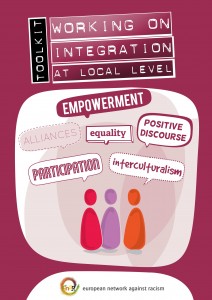This year for Christmas we might get the new government’s integration policy. Should we rejoice or be worried? Reason to be cheerful no. 1 is the fact that integration is regarded as important and thus subject to public policy. There are many reasons to be worried judging by David Cameron’s and Theresa May’s statements on multiculturalism and protection of human rights viewing integration as a one-way process underpinned by the erosion of human rights.
Before jumping to any final conclusions about the policy, let’s imagine an integration policy that could really work in shaping productive and active UK citizens: the one rooted in the protection of human rights for all and understood as a two-way process in which mutual adjustments are made by all parties so to be able to work for a more equal and just society and common good. The policy where the state is a constructive and engaged partner in encouraging self-reliance rather than facilitating exclusion and neglect. The one that recognises the contribution that migrants make to society and economy. The one that is underpinned with adequate provision of language classes and other support towards employment and other forms of participation.
The one in which the schooling of migrant and minority children would be well thought through to meet their needs. Where political leaders would demonstrate wisdom and guidance to encourage diversity and interaction, where the press would cease to vilify migrants, or otherwise be penalised for biased negative labelling. Migrant communities would no longer be viewed as homogenous lumps of ‘others’ represented by unelected community leaders, but as a depository of individuals with potential and a right ‘to be’ whatever they liked without being assigned an identity. In short, a policy which, in few years, may generate a real sense of belonging and numerous active citizens and happier society for all of us.
 For the past few months, MRCF has been listening to and recording testimonies of people’s experience of integration. We opened up the space for a different kind of conversation in our Welcome Committee blog series. We shared our integration practices with our European partners, looked at integration practices elsewhere and gave it a lot of thought. We opened up our way of working to a peer review by the Migrants’ Rights Network in order to reflect and learn and share our successes and challenges in integration work. As a result the Forum’s model of working has been included in the report published by the European Network Against Racism, which offers case studies of best practices that are underpinned by key principles of integration. In addition to MRCF, the toolkit- Working on Integration at Local Level– includes examples of learning and good practice in five other European Countries.
For the past few months, MRCF has been listening to and recording testimonies of people’s experience of integration. We opened up the space for a different kind of conversation in our Welcome Committee blog series. We shared our integration practices with our European partners, looked at integration practices elsewhere and gave it a lot of thought. We opened up our way of working to a peer review by the Migrants’ Rights Network in order to reflect and learn and share our successes and challenges in integration work. As a result the Forum’s model of working has been included in the report published by the European Network Against Racism, which offers case studies of best practices that are underpinned by key principles of integration. In addition to MRCF, the toolkit- Working on Integration at Local Level– includes examples of learning and good practice in five other European Countries.
In addition to practical examples, the toolkit contains some basic principles that should underpin successful integration policy:
[ul style=”arrow”]
- Promote positive values, conceptions and principles
- Use positive terminology in the political discourse
- Take a human rights based approach to migration
- Comply with human rights
- Make use of demographic data, challenging assumptions
- Ensure anti-discrimination for all
- Respect the links between anti-discrimination, integration and social inclusion
- Enforce existing labour law
- Protect workers’ rights
- Ensure policy coherence
- Promote gender sensitive and age sensitive policy making
- Ensure participation and the migrants’ voice
- Ensure equality in education
- Recognise the global context
- Be proactive not reactive
[/ul]
In January 2012, MRCF will be launching multimedia report on what migrants have to say about integration. Watch this space.


